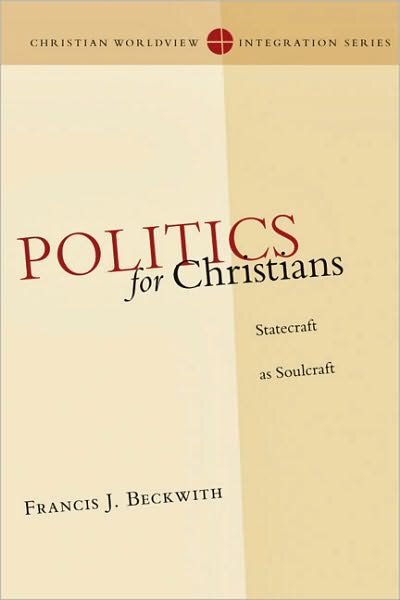Francis J. Beckwith, Politics for Christians, Statecraft as Soulcraft (Christian Worldview Integration Series). IVP Academic, 2010.
Referenced in: Christian Political Theory, Church and State Relations
LifeandLeadership.com Summary
Much of the missional and emergent conversations today emphasize the relationship of Christianity and politics. Not all agree with this emphasis. For those who arise from a tradition of non-involvement, someone needs to make the case for engagement. Francis Beckwith provides this in what may be called a Christian introduction to politics. It contributes well to this discussion alongside other resource listed in the guide to Christian Political Theory.
Beckwith begins by providing a brief overview of the study of politics, distinguishing between political theory, comparative politics, American politics, international relations, political economy, and public law.
Next, he addresses the relationship of Christians to a liberal democracy, i.e. a government that regards itself as accountable to the people to guarantee certain liberties toward the creation of a civil society. In this context he argues: “The scriptures seem to teach that people have an obligation to understand the nature of their government and its laws, and employ that knowledge so that the gospel is not disadvantaged by the state.” (73) The last phrase is especially important, “so that the gospel is not disadvantaged by the state.” This is the very least to which Christians are called politically. For example, if a state rules that marriage licenses should be given to same-sex couples, and ceases funding for Christian organizations that will not in turn arrange the adoption of children by these couples, does this not “disadvantage the gospel”? He also entertains the question of whether a Christian may support of non-Christian candidate for public office.
From there, he discusses the issue of the separation of church and state, describing the differences between strict separationists, moderates, and non-separationits. Another chapter deals with how the secular liberal idea of democracy calls for a “neutral public square,” which limits or excludes religious voices from shaping public policy, but in effect allows undemocratic perspectives to dominate. He says:
Rather than increasing liberty or political engagement, secular liberalism functions as a type of metaphysical litmus test that excludes religious and traditional points of view without even allowing proponents of these views to make their case. Christians should be leery of a perspective, like secular liberalism, that stipulates without argument that political positions that are theologically informed are automatically inferior and thus not worthy of serious consideration in the public square. (164)
The next chapter looks at the statement from the Declaration of Independence (1776) regarding “certain inalienable rights.” This implies that the American Founders believed in a natural moral law as the foundation of natural rights. The question is whether this foundation is best accounted for by the existence of God. Beckwith answers yes, and also believes humans can have knowledge of natural moral law apart from special revelation.
This is one of the best resources available for introducing the breadth of politics from a Christian perspective. I strongly recommend it.
From the Publisher
Politics is concerned with citizenship and the administration of justice—how communities are formed and governed. The role of Christians in the political process is hotly contested, but as citizens, Francis Beckwith argues, Christians have a rich heritage of sophisticated thought, as well as a genuine responsibility, to contribute to the shaping of public policy. In particular, Beckwith addresses the contention that Christians, or indeed religious citizens of any faith, should set aside their beliefs before they enter the public square. What role should religious citizens take in a liberal democracy? What is the proper separation of church and state? What place should be made for natural rights and the moral law within a secular state? This cogent introduction to political thought surveys political science, politics and government while making the case for how statecraft may genuinely contribute to soulcraft. Politics for Christians is part of The Christian Worldview Integration Series.
About the Author
Francis J. Beckwith is professor of philosophy at Baylor University and a resident scholar at Baylor’s Institute for Studies of Religion.
***For additional information on this resource, including reviews, click the bookstore links. Check the reference at page top or the links below for resource guides on related topics.***
See Other Resource Guides on Christian Social Ministry:
- Theological and Philosophical Foundations of Social Ministry
- Spirituality for Ministry of Social Compassion and Justice
- Strategies For Christian Social Ministry
- Perspectives and Strategies For Social Ministry Among the Urban Poor, Urban Ministry
- Christian Perspectives on Political Theory and Church-State Relations
- Christian Perspectives on Economics and Public Policy
See Resources on Over 100 Ministry Topics:


